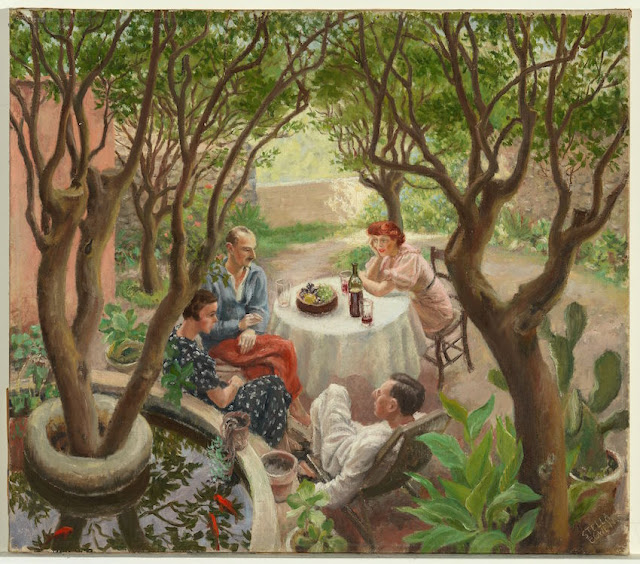Best Of Anaïs Nin's "Conversations with Anaïs Nin"
Here is a selection of memorable quotes from Conversations with Anaïs Nin, edited by Wendy M. DuBow.
 |
| Painting above: Provençal Conversation (c.1936) by Stella Bowen |
I was never deprived of the emotional experience of motherhood. There is plenty to mother in the world. I took Lawrence’s words: “Women should stop bringing children into the world. They should bring hope into the world.” I have had many children, really. Everyone who seeks to develop and grow needs a mother. Besides, three little girls have been named Anaïs.
p.73-74
Q: In an important sense, you are a revolutionary. What have you learned about yourself and other women through your solitary courage?
Anais: The importance of faith, the great importance of orientation and the inner life to withstand outer pressures. Also, the understanding that increased awareness will prevail and cause external changes. The importance of inner conviction. I had the love of my work and nothing could stop it.
p.96
The argument I had with Miller and Durrell that day as very significant because I spoke of their speaking of pride, and solitude and acting as God in creation and all that. And I said no, a woman isn’t going to create that way, not with pride, not with aloneness, not with loneliness, and not with isolation or breaking away from things in order to create. I knew that was wrong.
p.111
Now I understand a little better that we need symbols. I have had women that I could model myself after, women that I have worshipped, like Lou Salomé. I don’t know if you know Lou Andreas Salomé, who’s an important figure for me. I realize that people do need a symbol, and I realize that I’ve been made a symbol of a woman who struggled individually for her emancipation and was very independent and was a rebel. I didn’t realize any of this in the first few diaries. In the first few diaries, I was making my rebellions through men, letting Henry Miller fight Puritanism, letting Otto Rank fight Freud, letting Antonin Artaud impose new ideas for theatre, I was supportive--the assistant rebel. But then I began to realize that this meant that in myself I was a rebel too. I was expressing it through them. Finally, I began to really find my own rebellion.
Yes, I’m a mixture of all that [passion and reason, wildness and inhibition] I describe the conflicts between the various selves. But at some point, they end. When you are mature, it’s not so much choosing between one thing and another but learning to fuse them, learning to handle all of them, having six arms.
But I don’t like being made a legend [...] my dress cost $40 at Bullock’s in Los Angeles and my cape cost me $30 in Portugal. I’m a woman who really worked and had a lot of anguish and a lot of trouble. I don’t like being mystical. It dehumanizes you. Don’t you agree?
p.172
 |
| Painting above: Embankment Gardens (c.1938) by Stella Bowen |
Q: How does this “goodness” relate to woman’s search for her own psychology?
A: I think it was imposed on woman. This idea was taught to her by the Judeo-Christian morality. Woman was supposed to be unselfish, devoted, helpful, nourishing. And if she departed from this sort of behaviour for one moment, she felt burdened by guilt. But Djuna [in Four-Chambered Heart] begins to question it. “Am I really good,” she asks, “or am I trying to fit a form, a structure, a pattern that was given to me?
p.181-182
It’s a tendency women have had all along, not to merge, but to submerge their personalities in those of their men. This can be dangerous, depending on the choice of partner. On the other hand, some women choose a weak person, someone who will not interfere with their growth. That’s a negative way of seeking freedom.
p.182
Q: Can you say anything to those who are still too frightened to make the ‘difficult voyage’?
A: Yes. Keep a vision of the ultimate goal, reward. An expanded life, free of anxiety and conflict. Achievement in love and creation. A sense of deep fulfillment.
I often look at my life as fiction, as an adventure story--something to be worked through. This often rescues me from depression over a sense of limitations.
p.230-231
Of course, there is inherent in the realm of fantasy a great freedom which is at the same time exhilarating and frightening. For a long time I wanted the psychologist to hold my hand, the hand of a lost child and an insecure woman. I craved assurance that I need not lose my humanity in becoming an artist. Moreover, I needed to understand that I could define the creative life in my own terms. The only way to effect a harmony between the demands of daily reality and those of creative productivity is to work out these concerns while living them, however slow and undefined that process may be. I wanted always to be available to others, but at the same time time I had to learn to avoid stumbling into the trap of self-denial which ensnares so many women.
p.232

